Despite popular soul acts, some experimental, less dance-oriented groups were appearing locally and a variety of styles were on offer over 1967’s first weekend at the Birdcage with “Freakout” on Friday, the Art Woods on Saturday and Prince Bustup’s ska records on Sunday.
Early in January 1967, the In Crowd and Geno Washington played there, before on 21 January Pink Floyd came to Portsmouth for the first time to play at the Birdcage.
The Evening News advertisement offered “Pink ‘Psychedelic’ Floyd.
Tipped for Top this Year! The most daring excursion ever ventured!” and also promised “pretty lights”.
Spinner’s cryptic opinion was “thumbs down for the Pink Floyd at the Birdcage” but it was unclear if others shared his view.
Charlie & Inez Foxx visited again and Spinner believed the weekly ska record sessions, indicated “the biggest boom yet”.
The In Place, St Paul’s Square was renamed the Brook Club and featured X-Its, while the Gaudy Doyle Set reverted to their original name, the Informers.
The Loose Ends opened the year at Thorngate Halls and the St Louis Checks and Nite People were at the Indigo Vat.
Portsmouth’s College of Technology students were promoting more actively and in mid- January presented Alan Price and the Wrong Direction at South Parade Pier.
Frenzy increased their personnel to a seven-piece with Ray King (saxophone) and Dave Gautrey (trumpet).
Having nominated “It Couldn’t Happen Here” as the worst record of 1966 it was a surprise that Spinner described the new Mothers of Invention album as “incredible”.
He wasn’t sure about all the new music however, suggesting “now we’ve heard it all with America’s Electric Prunes”.
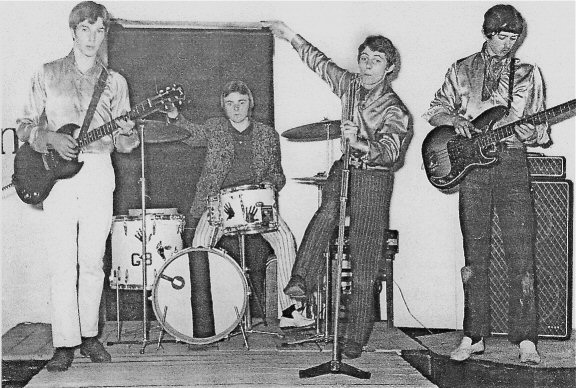
Morgans Camel Train.
|
Morgan’s Camel Train planned a tour of Italy, the Impact renamed themselves Indigo Mood and the Jack Hawkins Orchestra broadcast on the Light Programme’s “Swingalong”.
Pat Nelson was also working for the BBC as the host of the weekly “Young Folk – Old Folk” on the Home Service.
The Rolling Stones upset regular viewers of ITV’s weekly “Sunday Night at the London Palladium” by refusing to join other stars on the end-of-show carousel.
The Downbeat column feared that jazz was dying locally although the New Tia Juana Jazz Band were still appearing regularly at the Oasis.
There was no pop in January at the Guildhall, while Gosport’s New Spot offered Birdcage regulars Herbie Goins and the Shevells.
February opened at the Birdcage with the return of the Who but it was also the final appearance of DJ Pete Brady and there were fewer live acts and a couple of cancellations over the next two months.
Those that came included soul and R&B acts like the Drifters, Chris Farlowe, Geno Washington and the Soul Sisters but also the Move, the In Crowd (soon to be Tomorrow), the Knack (with future Gun member Paul Gurvitz), and Boz Burrell (future King Crimson/Bad Company).
Local bands were rare after the Wrong Direction on New Year’s Eve although Academy appeared in April.
In London however, the Inspiration enjoyed a successful debut at Tiles – immortalised in Tom Wolfe’s magazine article “The Noonday Underground”.
The Jug of Punch advertised many local folk performers for a “Come All Ye” session including Les Windley, Jon Isherwood, Pat Nelson, Barries Roberts and Gordon, Anne Lawrence, Len Betts and Phil Tree.
This was followed by an appearance of television folk stars Robin Hall & Jimmie MacGregor.
Johnny Silvo appeared at the Railway Hotel and in concert at Oak Park School, Havant with Pat Nelson and the Broadsiders.
Students held a folk gig at the Savoy with Dorris Henderson, Johnny Silvo, 3 City 4, and College Folk.
The folk scene continued to be very active and even on ‘nights off’ there were often impromptu sessions in Southsea pubs like the Apsley and the Auckland.
The Oasis presented Tranby’s Jazzband but there was very little jazz in local clubs although Duke Ellington brought his Orchestra to the Guildhall for the last time on Sunday 5 February.
The Meddy Evils played Leigh Park Community Centre and Gosport’s New Spot over the same weekend.
Mike Stuart Span and Morgan’s Camel Train were at the Parlour and the Wrong Direction at the Indigo Vat.
Portsmouth’s Licensing Committee heard that more young people than ever had been “convicted for drinking offences” although more than two-thirds of those misbehaving were naval ratings.
The Evening News front page on 18 February 1967 ran a “stark warning on dangers of drugs” with statistics that prosecutions for possessing hemp had increased ten times in a decade and for heroin four times in one year.
Five days later the main headline ran “Too Easy to Get Drugs - Doctor” adding “Grave Concern about Young” and the next day we learned that local schoolteachers were “alert to drugs peril”.
In West Sussex, police raided Redlands, and charged Rolling Stones Keith Richard and Mick Jagger with possessing drugs.
Students preparing to launch their latest ‘Rag Week’ – ‘Stweek 67’ – agreed to 12 rules of behaviour and opened their Stweekotheque for two weeks in the Guildhall Square.
The Manager of the Locarno challenged the city’s teenagers to “take up ballroom dancing and show how swinging Portsmouth is”.
Elsewhere the Savoy offered record sessions of a more contemporary kind while Fortes took over the management of South Parade Pier announcing support for local dramatic groups but an end to major artists for ‘end-of-the-pier’ shows.
Spinner described the new Rolling Stones album Aftermath as their “long road to insignificance” but he was more enthusiastic about the new Simon Dupree single “Reservations” which they were promoting with local record store appearances.
They also attracted a big crowd to a Portsmouth Youth Organisation dance at Clarence Pier and BBC screened their documentary on 17 March.
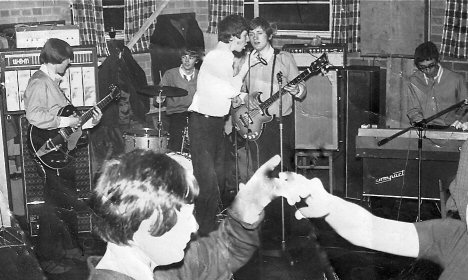
Travis Raymar.
|
Travis Raymar played at the Parlour, the Inspiration and St Louis Checks at the Indigo Vat, Southampton’s Courtelles at the Brook Club and the Loot at the New Spot.
Roger Barber replaced Mick Reeves as the Talismen’s vocalist as they shifted towards rhythm & blues and Tamla Motown.
Future Heaven drummer Malcolm Glover joined Frenzy, while Academy, “very popular” at Manor Court, were generally attracting good reviews including an appearance at the opening night of “Unliteabsorbing” – a new club or “Audio Visual Environment” underneath the Birdcage, which Spinner thought was the first in any British city club.
Highbury students presented “Euphoria” at their college with Eyes of Blue and Sons of Man, while the Shame including Greg Lake were at the Indigo Vat and the Untamed at the Parlour.
Long John Baldry brought his new group Bluesology to South Parade Pier.
The Raisins played Thorngate Halls after which groups disappeared for a while.
The Birdcage too was fairly low-key in March 1967 but there were some varied nights at the Guildhall with “Jazz from the Swinging Era”, the Swingle Singers and a package with Gene Pitney, the Troggs, David Garrick, the Loot and Sounds Incorporated.
Buddy Rich would be next in early April, then Mantovani.
Simon Dupree played an event called “Heatrave” at the Savoy with the Inspiration.
Malcolm Price returned to the Folkhouse Club and American Hedy West came to the Ballads & Blues Club – she was perhaps one of the most underrated of the young American singers of the time, recording three albums for Topic Records in Britain in the period.
In mid-March Jon Isherwood played the Pomme D’Or, Talbot Hotel and Folkhouse over four nights.
Wizz Jones & Pete Stanley brought bluegrass to the Folkhouse and Jo Ann Kelly her Memphis Minnie-style blues to the Railway Hotel.
Jazz became more regular at North End’s Oasis again with Tia Juana Jazz Band and then Ken Colyer
Easter was lively at the Birdcage where Chris Farlowe and the Academy played the latest all-nighter.
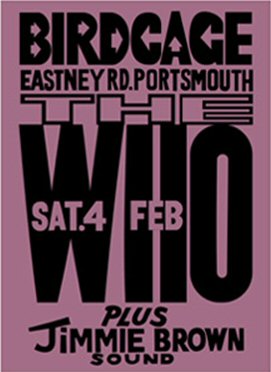
The Who at the Birdcage Eastney Road Portsmouth 4th february 1967.
|
John Vivash opened two clubs locally with the Informers at Milton’s Oyster House and the Vogue in Havant.
March ended with the Spinners at the Folkhouse, the Academy at the Indigo Vat and Travis Raymar at the Savoy.
Pink Floyd returned to the Birdcage in April (7/6d) as Saturdays became the only night to see live bands.
The genre mixing continued as Geno Washington (12/6d), the Move, the Soul Sisters and the In Crowd arrived on successive Saturdays.
Otherwise there were record nights including Tony Blackburn with a Big L ‘Pirate’ Night.
The Savoy opened the month with Travis Raymar, while the Sons of Man and St Louis Checks were at the Indigo Vat again.
The Spinners played at Jon Isherwood’s Sunday club and that same week saw Nina Simone, black comedian Dick Gregory and the Peddlars at the Guildhall.
Spinner suggested the audience was like a “Portsmouth pop people’s Who’s Who?” On the following night, the Oasis offered a mix of jazz and folk with Max Collie’s Rhythm Aces, local bluegrass group the Cumberland Echoes and Jakki.
Jazz was fairly frequent at the Oasis in the spring and there were still regular folk events around the city and region but by mid-May, jazz at the Oasis had “dried up”.
Buddy Rich gave a “primitive, exciting, barnstorming” performance at the Guildhall while organist John Garr offered “swinging pops” and “any request” on South Parade Pier.
The Evening News reported the city’s first prosecution for possession of LSD after a ‘tripping’ youth was arrested in hospital, having “stripped off his clothing and jumped through a first-floor window”.
The city developed a strategy for addressing problems with drugs including pamphlets to be made available to all school pupils over the age of 12.
Drug taking was shown in a party scene in the newly released film Blow Up, which the newspaper suggested was “a close but distorted look at the swinging scene”.
On 11 May the newspaper reported that Mick Jagger and Keith Richard had been sent for trial.
Simon Dupree recorded their third single “Day Time, Night Time” which Spinner described as their “best yet”.
They joined a pop package tour starring the Beach Boys, including Southampton’s Nite People, Peter Jay & the Jaywalkers (with Terry Reid) and Helen Shapiro.
The Meddy Evils had become the Quik and released their first single, with the flip “Bert’s Apple Crumble” becoming a club favourite.
The St Louis Checks had a single ready for release with the group possibly renamed as ‘the Trip’.
The Dead Sea Fruit and Blackout appeared at Highbury’s “Annihilation 2000” dance and the Academy were advertised at Portchester Community Centre but “no jeans please!” The Inspiration planned to reform with an “all-action visual show” and guitarist Brian Kemp joined Indigo Mood on piano – replaced by Dave Clark.
Bob Rose moved from bass to vocals with Travis Raymar and Mick Legg joined on bass as Morgan’s Camel Train split.
Spinner ran a feature on another Portsmouth guitarist Terry Slater, once with the Flintstones and now at 27 working regularly with the Everly Brothers.
Portsmouth’s Gary Hayes Trio were enjoying success on the national night club circuit.
Spinner suggested it was “time the money moguls spared a thought for the members at Eastney” where the first May gig was Georgie Fame on Friday 12th, after which there were no record sessions and just three more Birdcage Saturdays with Joyce Bond, Prince Buster and Amen Corner.
The Marina ran a Musicians’ Benefit Night featuring local modern jazz performers, while Johnny Silvo, Diz Dizley, Roger Evans, Bob Davenport and Cyril Tawney were at the local folk clubs.
Zack’s Shack was back with a “Rave Beat Dance”, while Cosham Civic Centre presented Illusion at another “Rave Dance”.
The Queen’s Hotel, Southsea was still featuring Bill Cole and a dinner dance every Saturday.
Spinner predicted that the Beatles new album (released 1 June 1967) would be “about as far out as you can get!” He also welcomed the new Procul Harum single “A Whiter Shade of Pale” although he knew little about the group despite the fact that most had been in the Paramounts, regular Portsmouth visitors.

Soul Society.
|
Spinner suggested that the Soul Society might replace Simon Dupree in local affections, praising their recent show at the Soul Parlour.
He admired new drummer Alan Dodds as “far beyond recognized local standards”.
Lee Tower Ballroom was more active with the T Birds who welcomed Denny Barnes on guitar.
Meanwhile the Frenzy ‘retired’ to rethink their music.
DJs were more active around the city with Dave Lee Travis visiting Portchester Community Centre as fellow ‘Pirate’ Simon Dee starred in his television show “Dee Time”.
British Rail reintroduced summer Beat Cruises starting with Simon Dupree and the Sons of Man.
Future visitors would include the Amboy Dukes, Talismen, Peter Jay & Jaywalkers, Shevelles, Gass, St Louis Checks, Soul Society and Wrong Direction – and large audiences.
Manor Court Youth Club offered Sounds Incorporated and Chances R, while Manchester’s soul sextet Powerhouse visited St Peter’s & St Paul’s Hall, Cosham and Zack’s Shack for the Whitsun weekend.
The Tremeloes, topping the singles chart, appeared at the Hayling Carnival and on the end of Ryde Pier.
South Parade Pier re-opened with new bars but no special entertainment or big summer stars.
The Portsmouth City Silver Band played there every Sunday afternoon.
June 1967 opened with Spinner’s review of “The Beatles’ Journey into the Unknown”, their “epic” new album Sergeant Pepper’s Lonely Hearts Club Band.
He suggested that the Beach Boys and the Hollies were now producing “better pop” but the Beatles were disappearing “over the horizon” having produced “an entity similar in effect to the best epic film”.
Nonetheless, in the following week he revealed that locally “an awful lot of people claim to dislike” the album.
Portsmouth’s mod headquarters re-opened as the ‘New’ Birdcage with less publicity and varied acts including Alan Bown Set, Geno Washington, the Herd and the Action’s last appearance.
There were weekly discotheque nights, while Jimmy James & the Vagabonds appeared at a rare Savoy event for a student dance.
Former Rival, Mick Wallis, was enjoying solo success on the London cabaret scene and released a single “It’s On You Girl” on RCA.
Sons of Man drummer Graham Bowden retired, and the Academy played the Indigo Vat on the 4 June 1967 but then split.
Organist Rod Watts replaced Mick Cooper in Soul Society while Mark Tuddenham and Graham Hunt from Academy joined Bryan Hug’s new five-part harmony group.
Bryan’s sister Jane was enjoying success as a member of the folk group Weaver’s Green.
Former Birdcage DJ Pete Brady, was said to be “experimenting with backing tapes of noises and projected kaleidoscopes for his forthcoming musical ventures”.
In mid-summer, the Guildhall offered the Jacques Loussier Trio, Julie Felix and Acker Bilk but no rock or pop while the King’s Theatre had Englebert Humperdinck and Joan Regan for one week.
There were still advertisements for Old Time Dancing in schools like Dorothy Whitbread’s.
In Gosport, the Blackout were now singular (not Blackouts).
They had not featured in the last local poll but Spinner described them as “much improved”.
However, he felt that the first album Without Reservations by local stars Simon Dupree & the Big Sound’s lacked “a distinctive recorded sound” although he predicted that their next single would be “very different”.
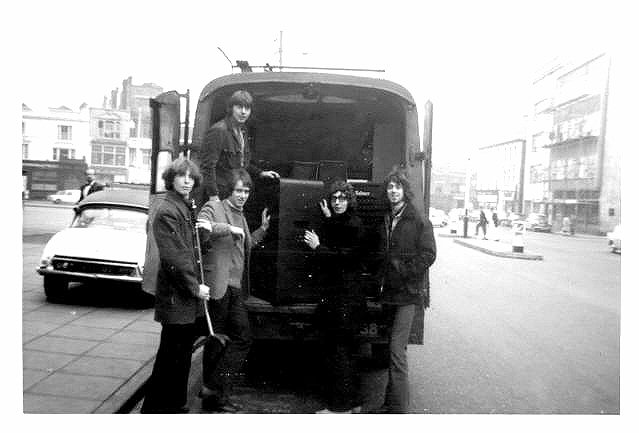
Tangerine Slide in the Guildhall Square.
|
Travis Raymar were renamed Tangerine Slyde and hoped “to please with pure psychedelia”, including the possibility of an increasingly fashionable light show.
Jimi Hendrix released his first album and influenced the Fruits of Love.
The ‘Summer of Love’ had arrived in Portsmouth although it was on trial as the Evening News led its front page with “The Agony of Seeing Your Idols Jailed” (30 June 1967) followed by “Rolling Stones’ Appeal Starts” – a reference to the drugs trial of Jagger and Richards in Chichester.
Three days later they printed a front-page photograph of Mr & Mrs George Harrison looking “like a pair of hippies”.
The Beatles performed “All You Need is Love” on the “Our World” television satellite broadcast experiment at the end of June, and Spinner reported the British release of USA Elektra albums, advising us to watch out for Love and the Doors.
He predicted a new single by Scott McKenzie could be “very big indeed”.
Denny Laine’s Electric String Band played the New Birdcage and mysteriously, John Mayall arrived on 8 July but Herbie Goins performed while a week later, Procul Harum were advertised, never appeared and were replaced by Graham Bond.
The Vagabonds then played two of three consecutive Saturdays but the end was near.
The Locarno offered a Miss United Kingdom Show, Kenneth Connor and Charles Hawtrey starred in Carry On Laughing at the King’s Theatre and Billy Smart’s Circus was on Southsea Common.
The Savoy had a Minstrel Show and Adge Cutler & the Wurzels were booked for August at the Guildhall.
Banjoist Barry Gordon had been on the local folk scene from its start and took over running the Railway Folk Club on Mondays.
Havant’s Jug of Punch Folk Club hosted Liverpool’s quartet the Spinners and in September the same club featured British stalwarts the Ian Campbell Folk Group.
At the Star in Lake Road, Jon Isherwood held his own ‘Stag’ night.
While the New Birdcage and many of the city’s original mods moved on from soul music, the Locarno Ballroom in Arundel Street presented Geno Washington & Ram Jam Band.
Meanwhile the new experimental approach was increasingly quirky.
The Wrong Direction ran a gig where the entry charge was a halfpenny short of five bob plus a sweet! Band names changed too – Mood became Crimson Confusion although they enjoyed little success.
Spinner reported that newly-formed Coconut Mushroom with a repertoire based on the new West Coast bands were to “present the city’s first home-grown attempt at a fully fledged light show and psychedelic ‘happening’ at the Parlour”.
The photograph accompanying the piece showed the first version of the band who also appeared on a Beat Cruise where “their lights wouldn’t work … but their black, red & white face paint did”.
This first version included Alan Gordon who would enjoy success in the 1970s with Hector.
Against the Psychedelic trend, Spinner reported the formation of the Harlem Soul Band, soon renamed Harlem Speakeasy.
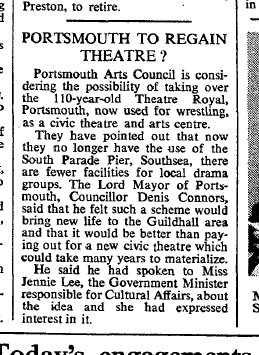
9th August 1967 from the Times.
|
Sadly the New Birdcage was short-lived.
It closed after Aynsley Dunbar’s Blues Band appeared on Saturday 19 August and the soulful Joyce Bond Show on Saturday 26 August.
The venue would re-open as the Brave New World in December but its time as a major Portsmouth venue was pretty much over after a couple of years of major influence and some nights of real magic.
As the summer of love turned into autumn, local bands Blackout, the St Louis Checks, Talismen, and Coconut Mushroom appeared in the city and Frank Kelly was singing with Dave ‘Digger’ Hart Combo.
The Soul Society planned a “change of name & style to include flute and other instruments plus a dash of jazz”.
In addition a number of local blues bands emerged, mirroring the increasing popularity of John Mayall and Fleetwood Mac - among them Chicago’s Insolence.
The Kinks played at the Savoy (10/-) and the Drifters entertained soul fans at the Locarno.
Spinner reported “local interest” in traditional jazz and the Oasis featured the “ultra pure” Ken Colyer.
The media reported a rising bank rate with national unemployment above half-a-million.
The Evening News carried advertisements for Ford cars: Cortina (1965) £565, Zodiac (1967) £1,125.
TV rentals were 9/9d pw, TV purchase 59½ guineas, 4-speed Record player 12½ guineas and the Co-op Store in Fratton Road was advertising LPs for around 32/-
Three years earlier, the Roadrunners had been one of the main support acts at the Rendezvous and played regularly around the city before becoming Simon Dupree & the Big Sound.
In October 1967 the group’s Phil Shulman told Spinner that the “early years at the Indigo Vat were what decided us to turn professional” while as predicted, their new single “Kites” was “completely different from the hard-driving soul sound” of the band – it would of course bring their only Top Ten success.
The Sons of Man disbanded.
In October the Railway Folk Club featured the accomplished local guitarist Barry Roberts while Pat Nelson played at the Folkhouse.
The Crusade version of John Mayall’s Bluesbreakers with future Rolling Stone Mick Taylor, played at South Parade Pier.
On 13 November, the Action played at North End’s Oasis/Parlour and three days later, BBC 1’s Top of Pops featured Simon Dupree & the Big Sound (“Kites”) as the ‘Tip for the Top’ feature.
BBC2 offered The Andy Williams Show, but BBC1 announced the end of Juke Box Jury after 8 years, while the new Radio One was only broadcasting until 7.30pm.
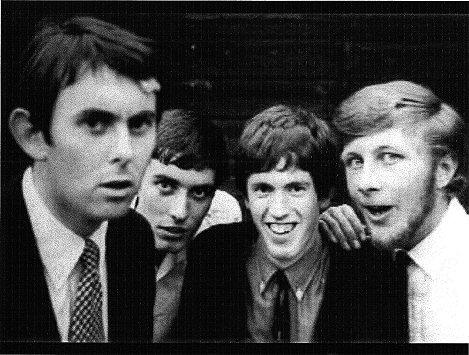
Sons of man.
|
An extraordinary bill at Portsmouth Guildhall on 22 November featured Jimi Hendrix Experience, the Pink Floyd, the Nice, the Move and Eire Apparent.
Hendrix played for about 40 minutes and the others for less time in order to present two shows on the evening.
The tour ended with a series of gigs in London as Hendrix became increasingly popular.
Elsewhere, the Savoy presented The Alan Bown!, Marmalade and the Nite People while the Guildhall hosted a student dance with Arthur Brown.
Spinner reported that he was “dazzling” but that some of his stage comments were “distasteful”.
Eastney’s Brave New World opened on Saturday 16 December with Ronnie Jones and forthcoming attractions were said to include Hendrix, Cream, Nice and Vagabonds – some of which was wishful thinking.
Manager Ricky Martin announced a new version of Coconut Mushroom would reappear at the Vat.
The Move played at the Locarno, while the Bryan Hug Group had a song on the soundtrack of Up the Junction.
They re-named themselves Cherry Smash and released “Songs of Love” on 29 December.
There were “light shows and old time movies at Thorngate’s Thursday sessions”.
Tangerine Slyde were now heavily ‘west coast’ influenced and also featured go-go dancers.
The Evening News printed a stage photograph of St Louis Checks’ singer Chris West in 1920s ‘gangster’ clothes as the film Bonnie & Clyde made a fashion impact.
Harlem Soul Band became a six-piece, re-named Harlem Speakeasy with a short residency at the Brave New World starting on Christmas Eve.
The Eastney club also presented the Mike Cotton Sound and had Erroll Bruce as regular DJ.
They ended the year with the Nice and on New Year’s Eve, the Vagabonds.
As Christmas approached, the Talismen retired to rethink their act - returning in March 1968 as Lace.
Manor Court in Drayton the most prominent of the youth clubs promoted three acts, Alan Bown, Wrong Direction and Perception and there were three contemporary bands at the Savoy, Amen Corner, Action and St Louis Checks.
Spinner ended 1967 with a review and his latest Poll results.
He described “ contrasts”, between war/peace, rock-blues/ballads, flower clothes/immaculate suits, Hendrix/ Humperdinck.
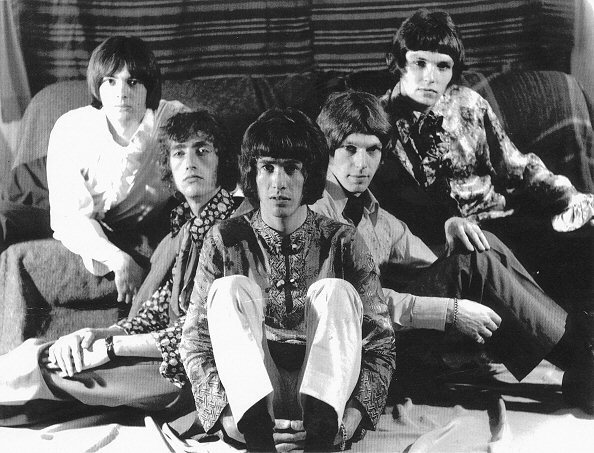
Coconut Mushroom.
|
He mentioned the Bee Gees, Lulu and the Beach Boys suggesting the latter had “declined…after the beautiful Pet Sounds” and was equally critical of Radio 1 suggesting it had “failed to provide a better alternative” to the pirate stations.
His latest Poll shifted Simon Dupree to the visitors’ category.
Locally there was no clear pattern as Soul Society moved up and Blackout, Harlem Speakeasy and Coconut Mushroom all playing in different styles appeared.
Among the visitors, the popularity of Birdcage favourites Vagabonds and Action evaporated and the newer sounds were having a greater impact:
Local 1-Blackout, 2-Wrong Direction, 3-Coconut Mushroom, 4-Soul Society, 5-Inspiration 6-St Louis Checks, 7-Harlem Speakeasy, 8-Cloud, 9-Talismen, 10-Scheme
Visitors 1-Alan Bown!, 2-Jimi Hendrix Experience, 3-Amboy Dukes, 4-Simon Dupree & Big Sound, 5-Amen Corner, 6-Move, 7-Nice, 8-Geno W, 9-Gass, 10-Arthur Brown/John Mayall.
Paulsgrove Sec Modern 15th December 1967. It was a Friday night and all went well until near the end.
One of the group onstage carried out at that time an outrages act which did not impress the headmistress.
They were a Bournemouth band, featuring Greg Lake at one stage. That may well be Greg Lake's autograph at top of the poster. Another member of Bournemouth band The Shame was John Dickinson.
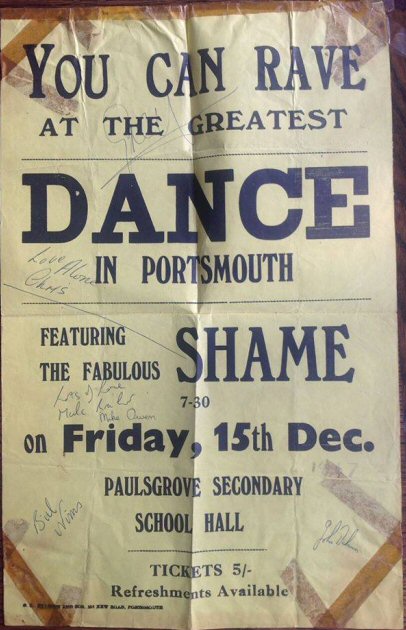
|








